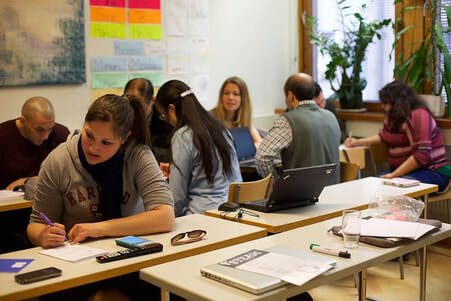Andragogy, Pedagogy
 During the 1920's, two brothers taught at the University of Prague in the Faculty of Education. The younger brother, Peter, was an expert in children’s education; the older, Andrew, specialized in the emerging field of adult education. They met regularly to discuss the differences and similarities between their respective fields of study.
During the 1920's, two brothers taught at the University of Prague in the Faculty of Education. The younger brother, Peter, was an expert in children’s education; the older, Andrew, specialized in the emerging field of adult education. They met regularly to discuss the differences and similarities between their respective fields of study.Their students were part of these energetic and enthusiastic discussions which often occurred in the coffee houses and pubs of Prague, some of which were meeting places for Peter Gogy’s students and some for Andrew’s.
Over time, two schools of thought developed: Petergogy (the study of children’s education) and Andrewgogy (the study of adult education). These terms, like Darwinism or Marxism also named for their founders, would have continued except for the modesty of Peter and the aesthetics of Andrew. Peter didn’t want a theory named after him; Andrew simply thought that such names were not elegant: Gogyism?! Hmmm. Who would want to call themself a Gogyist? What to do? The Gogy brothers resolved to give their theories more scholarly and credible scientific names.
Peter reminded Andrew that their family name, Gogy, came from Greek agogos (leader). Peter combined agogos with Greek paido (child) and came up with the word paidagogos (in English, pedagog and pedagogy). Andrew reminded Peter that the ancient Greek word paidagogos referred to the family servant who led or took the children to school. Andrew’s view was that a teacher of adults was more like a servant or facilitator than a leader. Of course, this set off a whole new round of debate and discussion between themselves and their students.
Andrew, who thought of adults as ‘mankind’, turned from paidagogos to the Greek word for man (andro). He suggested that adult students, responsible for their own learning, could be considered an andragogus (in English, andragog or andragogy).
Peter pointed out that andragogus only referred to men—what about women? Andrew puzzled over this. He considered androgynogogy (i.e., Greek andro = man + Latin gyne = woman) as well as androidogogy (from android, an 18th century word) but neither term caught on. As it turned out, andragogy is the word that stuck. Some have asked why Andrew didn’t consider using Greek anthropos (human being) and coin the term anthrogogy.
The Gogy brothers would have been pleased to learn that their distant Scottish cousin Hugh Gogy had developed a system of self-determined learning (heutagogy) in the 1990s while living far from formal schooling in the Highland countryside.
My apologies to Malcolm Knowles.
Reference: Online Etymological Dictionary, https://www.etymonline.com/
Published on June 05, 2023 07:56
No comments have been added yet.



